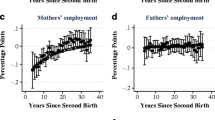Abstract.
This paper analyses the effects of expected earnings and local markets conditions on the behaviour of young adults with high school diplomas. Decisions to either remain in the parental home or form a new household are modelled jointly with those of either gaining work experience or investing in a university education. Expected lifetime earnings are found to play a crucial role in determining the choice of studying and residing with parents. Poor labour market opportunities discourage young people from working and induce them to study. The cost of housing greatly influences the choice of working and leaving the parental home.
Similar content being viewed by others
Author information
Authors and Affiliations
Additional information
Received: 23 March 2001/Accepted: 26 November 2001
All correspondence to Gianna Claudia Giannelli. Helpful comments by two anonymous referees are gratefully acknowledged. Responsible editor: John F. Ermisch.
Rights and permissions
About this article
Cite this article
Giannelli, G., Monfardini, C. Joint decisions on household membership and human capital accumulation of youths. The role of expected earnings and local markets. J Popul Econ 16, 265–285 (2003). https://doi.org/10.1007/s001480200119
Issue Date:
DOI: https://doi.org/10.1007/s001480200119




